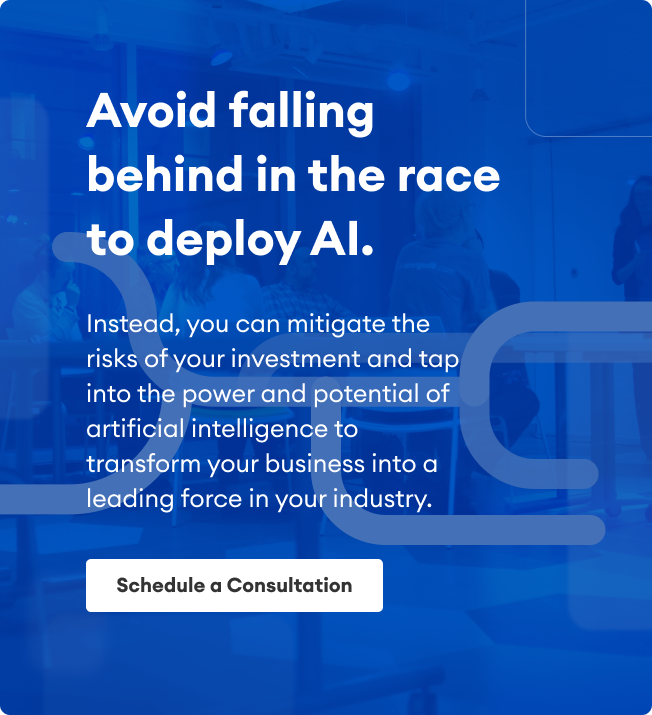Intelligent Automation (sometimes called cognitive automation) is the next step in the evolution of technology. At the intersection of Robotic Process Automation (RPA) and Artificial Intelligence (AI), intelligent automation helps businesses increase efficiencies, reduce costs, and improve their bottom line.
But implementing intelligent automation into your workflow isn’t always straightforward. Despite the transformative potential of AI, companies can struggle because they get matched with the wrong solution for their needs, leading to wasted time, effort, and funds.
This is one of the primary reasons our clients come to AI Guides. Instead of guessing and trying various artificial intelligence solutions, we create the right AI strategy for an organization, culture, and problems so that they can truly leverage the power and virtually limitless potential of artificial intelligence. (Plus, we’re Digital Advisors for the Canadian Digital Adoption Program–you can read about that here.)
AI Guides provide independent advice on the best AI fit for your environment. And that fit might be intelligent automation tools, RPA tools – or both together. Let’s figure it out.
What is Intelligent Automation?
Intelligent automation is the application of artificial intelligence (AI) and related technologies to automate business processes. It encompasses a range of capabilities including Robotic Process Automation (RPA), machine learning (ML), natural language processing (NLP), deep learning, and computer vision.
Intelligent automation can help organizations automate tasks like data entry, customer service, and financial operations to improve employee engagement, reduce operational costs, and streamline business processes.
Intelligent Automation vs RPA
The terms “intelligent automation” and “RPA” are often used interchangeably, but there is a key difference between the two.
Robotic Process Automation is the automating of routine tasks, while intelligent automation is the application of artificial intelligence and machine learning to automate more sophisticated and dynamic tasks, or tasks requiring decision-making processes.
RPA is a great way for companies to increase their efficiency. RPA can take on manual tasks that are high volume, rules-based, and repetitive. Whether it’s identifying data or copy and pasting text, RPA can do simple tasks just like humans can – except it’s done more accurately, consistently, and repeatedly.
While RPA is incredibly helpful, intelligent automation adds in cognitive processes implemented through machine learning, natural language processing, and neural networks. This allows for decision making without any manual interventions. It’s also able to recognize and analyze unstructured or semi-structured data (think of files like PDFs, images, and videos) without using complex, rule-based training like RPA would.
While RPA is limited to automating routine tasks, intelligent automation can be used to create self-learning systems that can adapt to changes in the business environment.
Intelligent Automation vs Artificial Intelligence
There can be a lot of confusion about the difference between intelligent automation and artificial intelligence, but essentially, intelligent automation uses artificial intelligence technologies to do its jobs.
In fact, AI is the most critical component of intelligent automation (IA). As IBM explains, “using machine learning and complex algorithms to analyze structured and unstructured data, businesses can develop a knowledge base and formulate predictions based on that data.” In this way, AI can become the decision engine of intelligent automation.
Intelligent Automation vs Cognitive Automation
Many people use the terms “intelligent automation” and “cognitive automation” interchangeably — and they are essentially the same thing. The term “intelligent automation” puts the emphasis on the outcome or functionality, whereas “cognitive automation” emphasizes the mechanisms or types of tasks that are involved.
Cognitive automation is the use of artificial intelligence (AI) technologies to automate tasks that are currently done by humans, by imitating the ways humans think and process data. It often relies on machine learning and natural language processing to enable machines to understand and act on unstructured data.
Intelligent (cognitive) automation is used to improve businesses processes, like:
- Management investigation and recommendation systems
- Diagnosis and treatment systems
- Customer service support
- Threat intelligence and prevention systems
- Fraud analysis
- Finding the right insurance products
- Legal outcome predictions
From law offices to small businesses, intelligent (or cognitive) automation can help you see ROI on your business and unlock more growth.
At AI Guides, we help small- and medium-sized companies and professionals such as lawyers, doctors, accountants, insurance brokers to better serve their clients and complete cases more efficiently.
RPA vs Cognitive Automation
RPA is a type of automation that relies on software robots or bots to automate repetitive tasks. These bots can be programmed to mimic the actions of human users to carry out simple, routine tasks.
Cognitive automation, on the other hand, is a type of automation that uses artificial intelligence (AI) techniques to enable machines to learn and understand tasks on their own. Cognitive automation can be used to automate more complex tasks that require cognitive skills, such as decision-making and problem-solving.
If you have a clear problem with a clear solution that requires little human intervention, RPA might be all you need. But if you’re working with unstructured data and “human” judgment, cognitive or intelligent automation will be your best bet.
How Intelligent Automation Works
Intelligence automation uses the following capabilities to conduct and automate digital operations:
- Artificial intelligence: Artificial intelligence applications are software applications that mimic human thinking and learning through programming.
- Machine learning: Machine learning is a branch of artificial intelligence (AI) which focuses on the use of data and algorithms to imitate the way that humans learn, gradually improving its accuracy over time.
- Computer vision: Computer vision is the technology that transforms scanned documents or images into more machine processable data.
- NLP: Natural language processing is the automatic manipulation of natural language, like speech and text, by a software program.
- Process mining: Process mining is the method of diagnosing business processes as they currently exist, and then documenting and enhancing processes based on analysis.
- Neural networks: Artificial neural networks “mimic” the human brain through a set of algorithms. Neural networks consist of four main components: inputs, weights, a bias or threshold, and an output. The network “learns” as weights get stronger on certain neural connections, leading to more consistent outputs.
- Deep learning: Deep learning is referring to the depth of layers in a neural network and the complexity of connections between layers. A rule of thumb is that a neural network that has more than three layers (including inputs and outputs) can potentially be considered a deep learning algorithm.
Benefits of Intelligent Automation in Business
There are many potential benefits of intelligent automation in business, including the following:
- Increased efficiency and accuracy: Intelligent automation can improve the efficiency and accuracy of business processes by automating tasks that are repetitive and predictable. This can free up employees to focus on more important tasks, and it can also help to ensure that tasks are carried out accurately by reducing human error.
Improved customer service: IA can also help to improve customer service by automating tasks such as customer inquiries and order processing. This can help to improve the customer experience and increase customer satisfaction.
3. Reduced costs: IA can reduce costs by automating tasks that are manual, costly, or time-consuming for employees. This can help businesses to save money and improve their bottom line.
4. Increased competitiveness: Intelligent automation can help businesses to become more competitive by allowing them to automate tasks that are currently done manually. This can help businesses to improve their efficiency and speed – and therefore compete more effectively in the marketplace.
Intelligent Automation Tools & Solutions
In order to implement IA into your workflow, it’s important to take advantage of RPA and AI software. But which? One of the best parts of being AI consultants is being able to share our unbiased reviews on AI software solutions, so here they are.
RPA Tools
Robotic Process Automation is a great way for companies to increase their efficiency. RPA can take on manual tasks that are high volume, rules-based, and repetitive – and do it nonstop and the same way each time.
What tools can you use for RPA?
UiPath
UiPath is an RPA software designed to help businesses end repetitive tasks and make digital transformation a reality. Their various robotic processes streamline workflows, which makes organizations more profitable, flexible, and responsive. They also increase employee satisfaction, engagement, and productivity by removing mundane tasks from their workdays.
RPA is noninvasive and can be rapidly implemented to accelerate digital transformation. And it’s ideal for automating workflows that involve legacy systems that lack APIs, virtual desktop infrastructures (VDIs), or database access. UiPath offers almost endless products for their customers to see RPA success.
Speak to AI Guides today to take advantage of UiPath’s tools.
Open Bots
Open Bots is an RPA solution that allows you to build the robots you need for your intelligent automation needs. Bots can be programmed to open web pages and applications, complete keystrokes, navigate systems, and identify and extract data the same way a person would, but with greater speed and accuracy.
Understand Open Bots capabilities with AI Guides.
Blue Prism
Blue Prism is an intelligent automation platform that works to expand the scope of work your business can automate by integrating artificial intelligence (AI) and machine learning (ML) – increasing efficiency gains and return on investment.
Whether you’re looking to manage a complex infrastructure, maintain security and compliance, bring new products to market faster, or gain operational speed and agility in an uncertain economy, Blue Prism delivers — with the flexibility you need to create the business you want.
Learn more about Blue Prism’s IA today.
Automation Anywhere
Automation Anywhere is a “Automation software that anyone can use for any business process.” Their RPA software is a hyper flexible solution that helps companies automate various tasks in minutes, run business processes non-stop and error-free at speed and scale, and improve operational security, controls, and compliance.
Not sure what RPA solution is right for your business? Schedule your consultation with us so we can build your digital RPA workforce to supplement your human workforce.
RPA and AI Tools Combined
As great as RPA is, it still hits walls. For example, what if it needs to “read” an email attachment before continuing on with the next step in the workflow in order to figure out what to do?
For some of the vendors there is some AI functionality built in. These leading providers from above have some AI built in:
- UiPath
- Automation Anywhere
- Blue Prism
Make RPA even better with artificial intelligence! AI Guides can help you determine which solutions will work for you.
AI Tools
However, in lots of other cases there is a need to combine an RPA tool with an entirely other tool. Luckily, there are other niche vendors who provide additional AI functionality that works well with RPA.
Levity
Levity allows you to create your own AI for documents, images, or text through rule-based automation. You can take daily, repetitive tasks off your shoulders so your team can reach the next level of productivity.
Let us help you figure out if Levity is the right solution for you.
Work Fusion
Work Fusion allows you to build and modify a Digital Workforce with a no-/low-code approach. You can just drag and drop building blocks to make your digital “workers.” They even give names to their bots to make them seem more like team members.
Not sure Work Fusion is for you? Let us help you figure that out!
Sortspoke
SortSpoke is a cloud-based data extraction tool that uses AI/ML to help you turn even the most complex PDF documents into data. It helps turn unstructured data into structured data so that your RPA can continue to work on manual tasks.
Helpful, right? Let’s see if it will work for your business goals.
Pega
Pega helps optimize and automate back-end processes at scale. Their simple, powerful, real-time, low-code AI powers better outcomes across your business. Pega Process AI infuses automation with real-time workflow, AI, and event processing so you can automatically predict and avoid SLA breaches, preemptively address delays and service issues, and route work more effectively.
Then, you can monitor and optimize every process touchpoint with our unified industry-leading process mining, decision management, and machine learning capabilities.
Learn more about Pega’s AI power.
Rainbird
Rainbird is a no-code intelligent automation platform. It has three modules: Rainbird Infer, Rainbird Flow and Rainbird AutoML that you access through a visual interface, called Rainbird Studio.
You can create machine learning models and combine their predictions with Rainbird Infer to deliver high-quality, auditable decisions. Rainbird Infer makes RPA faster and cheaper to build, maintain and execute. It manages all of your decision logic holistically, delivering exceptional efficiency and scalability—so you can break free from the constraints of linear process design without starting from scratch.
All of these are solutions companies turn to when RPA hits a wall. And AI Guides can help you figure out exactly which one to use.
Access Intelligent and Cognitive Automation Solutions with AI Guides
Most organizations that try to adopt AI end up failing because they invest in the wrong solution. As AI consultants, we provide independent advice on the best fit for your environment and business needs.
AI consulting can not only help you find an AI solution for your company, but also help you to:
- Understand how AI can benefit company growth
- Take full advantage of the data you already have
- Determine which AI businesses are legitimate and which are not
- Remove repetitive, time-consuming tasks from your team’s workload
- Negotiate with AI vendors
- Build out a data team
- Create your own artificial intelligence application
- Provide employee training
- Estimate the ROI of a project, and get you there
Intelligent automation and AI Guides are here to make your work process a lot simpler, whether that work process is in a law firm, supply chain management, or medical office.
So if you have a specific use-case in mind, want to learn more, or would like to accelerate AI adoption at your company, schedule your consultation with our AI experts today so we can help you use AI to take your business to the next level.


